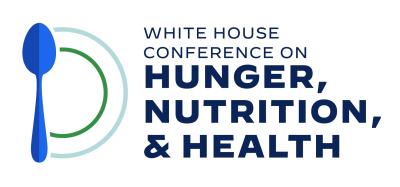White House Conference on Hunger, Nutrition, and Health

On September 28th, the Biden-Harris Administration will host the White House Conference on Hunger, Nutrition, and Health, with the goal of ending hunger and increasing healthy eating and physical activity by 2030, so that fewer Americans experience diet-related diseases like diabetes, obesity, and hypertension.
From www.health.gov --
"Millions of Americans are afflicted with food insecurity and diet-related diseases—including heart disease, obesity, and type 2 diabetes—which are some of the leading causes of death and disability in the U.S. The toll of hunger and these diseases is not distributed equally, disproportionately impacting underserved communities, including many Black, Latino, Asian American, Native Hawaiian and Pacific Islander, and Native American communities. And hunger and diet-related diseases affect many more communities, including rural communities, people with disabilities, older adults, LGBTQI+ people, military families, and military veterans.
Lack of access to healthy, safe, and affordable food, and to safe outdoor spaces, contributes to impacting hunger, diet-related diseases, and health disparities. The COVID-19 pandemic has exacerbated these challenges further.
On September 28, 2022, for the first time in over 50 years, the Biden-Harris Administration will host a White House Conference on Hunger, Nutrition, and Health. The First White House Conference on Food, Nutrition, and Health had a significant influence on the country’s food policy agenda for half a century. Now, again, we have the collective opportunity to chart a course for the future.
The Administration has set a goal of ending hunger and reducing dietrelated disease by increasing healthy eating and physical activity in the U.S. by 2030. This ambitious goal would mean that no Americans go hungry and fewer Americans experience diet-related diseases like diabetes, obesity, and hypertension. At the Conference, the Administration will announce a bold national strategy that outlines steps the federal government and other stakeholders will take to achieve this goal."
To end hunger and increase healthy eating and physical activity to reduce diet-related diseases and disparities, the Biden-Harris Administration has specified areas of action in five pillars:
1. Improve food access and affordability: End hunger by making it easier for everyone — including urban, suburban, rural, and Tribal communities — to access and afford food. For example, expand eligibility for and increase participation in food assistance programs and improve transportation to places where food is available.
2. Integrate nutrition and health: Prioritize the role of nutrition and food security in overall health, including disease prevention and management, and ensure that our health care system addresses the nutrition needs of all people.
3. Empower all consumers to make and have access to healthy choices: Foster environments that enable all people to easily make informed healthy choices, increase access to healthy food, encourage healthy workplace and school policies, and invest in public messaging and education campaigns that are culturally appropriate and resonate with specific communities.
4. Support physical activity for all: Make it easier for people to be more physically active (in part by ensuring that everyone has access to safe places to be active), increase awareness of the benefits of physical activity, and conduct research on and measure physical activity.
5. Enhance nutrition and food security research: Improve nutrition metrics, data collection, and research to inform nutrition and food security policy, particularly on issues of equity, access, and disparities.
The White House wants to hear your stories and experiences with hunger and/or diet-related diseases. Share Your Story here.
Recent Posts
- GrowNYC Publishes 2023 Impact Report
- 2024 Seasonal Greenmarkets and Farmstands Opening!
- GrowNYC's 2024 Plant Sale
- Use Pandemic EBT (P-EBT) with GrowNYC
- The 2024 Health Bucks are now available!
- Sign Our Petition: Save Community Composting
- 2023 Holiday Schedule - Greenmarkets, Farmstands, Food Scrap and Clothing Collections
- Deck the Halls - 2023 Greenmarket Gift Guide & Christmas Trees + Holiday Wreaths at Greenmarkets
- GrowNYC Weather & Site Closures
- Thanksgiving Week Schedule 2023 - Greenmarkets, Farmstands, Compost
Tags
- Grains
- compost
- recycle
- recycling
- greenmarket
- kids
- union square
- swap
- youthmarket
- grow to learn
- learn it grow it eat it
- reuse
Archives
- April 2024 (1)
- March 2024 (2)
- February 2024 (1)
- December 2023 (1)
- November 2023 (3)
- October 2023 (5)
- May 2023 (1)
- April 2023 (2)
- December 2022 (1)
- November 2022 (3)
- September 2022 (1)
- June 2022 (1)
- April 2022 (2)
- March 2022 (2)
- December 2021 (2)
- November 2021 (1)
- October 2021 (3)
- September 2021 (3)
- August 2021 (2)
- June 2021 (3)
- May 2021 (1)
- April 2021 (1)
- March 2021 (1)
- January 2021 (8)
- December 2020 (2)
- October 2020 (3)
- July 2020 (1)
- June 2020 (2)
- March 2020 (6)
- February 2020 (3)
- January 2020 (2)
- December 2019 (2)
- November 2019 (1)
- October 2019 (1)
- September 2019 (7)
- July 2019 (4)
- June 2019 (1)
- May 2019 (1)
- April 2019 (3)
- March 2019 (4)
- February 2019 (3)
- January 2019 (3)
- November 2018 (3)
- October 2018 (3)
- September 2018 (1)
- August 2018 (2)
- July 2018 (4)
- June 2018 (5)
- May 2018 (1)
- April 2018 (1)
- February 2018 (3)
- December 2017 (2)
- November 2017 (3)
- October 2017 (7)
- September 2017 (4)
- August 2017 (3)
- July 2017 (1)
- June 2017 (2)
- May 2017 (4)
- April 2017 (1)
- March 2017 (2)
- February 2017 (2)
- January 2017 (3)
- November 2016 (1)
- August 2016 (1)
- July 2016 (4)
- April 2016 (2)
- March 2016 (4)
- February 2016 (2)
- January 2016 (1)
- December 2015 (4)
- November 2015 (2)
- October 2015 (2)
- September 2015 (4)
- August 2015 (2)
- July 2015 (2)
- June 2015 (3)
- May 2015 (2)
- April 2015 (2)
- March 2015 (1)
- February 2015 (2)
- January 2015 (2)
- December 2014 (3)
- November 2014 (5)
- October 2014 (3)
- September 2014 (3)
- August 2014 (3)
- July 2014 (3)
- June 2014 (2)
- May 2014 (5)
- April 2014 (4)
- March 2014 (2)
- February 2014 (3)
- January 2014 (1)
- December 2013 (4)
- November 2013 (3)
- October 2013 (5)
- September 2013 (4)
- August 2013 (2)
- July 2013 (4)
- June 2013 (2)
- March 2013 (2)
- February 2013 (2)
- January 2013 (2)
- December 2012 (3)
- November 2012 (2)
- October 2012 (3)
- September 2012 (2)
- August 2012 (5)
- July 2012 (4)
- June 2012 (3)
- May 2012 (2)
- April 2012 (4)
- March 2012 (7)
- February 2012 (5)
- January 2012 (9)
- November 2011 (7)
- October 2011 (4)
- September 2011 (2)
- August 2011 (7)
- July 2011 (4)
- June 2011 (2)
- May 2011 (4)
- April 2011 (3)
- March 2011 (5)
- February 2011 (3)
- January 2011 (5)
- December 2010 (5)
- November 2010 (7)
- October 2010 (6)
- August 2010 (1)
- June 2009 (1)
- May 2009 (1)
- March 2009 (1)
- November 2008 (2)
- August 2008 (1)






